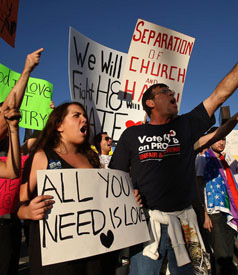
|  |  |  Americas & Beyond | November 2008 Americas & Beyond | November 2008  
Proposition 8 Gay Marriage Ban Goes to Supreme Court
 Maura Dolan & Jessica Garrison - The Los Angeles Times Maura Dolan & Jessica Garrison - The Los Angeles Times
go to original


| | In Los Angeles, a group of same-sex marriage supporters protest Proposition 8. Last weekend, thousands of Proposition 8 opponents took to the streets. In March, the California Supreme Court will address the same-sex marriage ban. (David McNew/Getty Images) | | |
The California high court will review legal challenges to Prop. 8. A hearing is set for March. Prior to a ruling, gay weddings will not be allowed to resume.

San Francisco - The California Supreme Court agreed today to review legal challenges to Prop. 8, the voter initiative that restored a ban on same-sex marriage, but refused to permit gay weddings to resume pending a ruling.

Meeting in closed session, the state high court asked litigants on both sides for more written arguments and scheduled a hearing for next March. The court also signaled its intention to decide the fate of existing same-sex marriages, asking litigants to argue that question.

Today's decision to review the lawsuits against Proposition 8 did not reveal how the court was leaning. The court could have dismissed the suits, but both opponents and supporters of Proposition 8 sought review to settle legal questions on a matter of statewide importance.

Some legal challengers also sought an order that would have permitted same-sex couples to marry until the cases were resolved, a position opposed by Atty. Gen. Jerry Brown and Proposition 8 supporters. Only Justice Carlos R. Moreno voted in the private conference to grant such a stay.

The order was signed by six of the court's seven justices. Justice Joyce Kennard did not sign, and the court said she would have invited a separate filing to determine the fate of existing same-sex marriages.

The court overturned a ban on same-sex marriage on May 15 in a 4-3 historic decision. Opponents of gay marriage gathered enough signatures to place Proposition 8 on the ballot as a proposed constitutional amendment.

Gay rights advocates argue that the measure was actually a constitutional revision, instead of a more limited amendment. A revision of the state Constitution can be placed before the voters only by a two-thirds vote of the Legislature or a constitutional convention.

Lawsuits to overturn the initiative contend it was a revision because it denied equal protection to a minority group and eviscerated a key constitutional guarantee. Supporters of Proposition 8 counter that it merely amended the constitution by resto ring a traditional definition of marriage.

The court's previous rulings on similar lawsuits have been mixed. The court has upheld at least six initiatives and rejected only two that were challenged as illegal revisions.

Supporters of Proposition 8 have threatened to mount a recall of any justice who votes to overturn the measure. The court's members serve 12-year terms and appear on the ballot unopposed in retention elections.

Although the court tends to defer to voter sentiment on initiative challenges, it has overturned popular ballot measures in the past.

In 1966, the California Supreme Court struck down an initiative that would have permitted racial discrimination in housing. Voters had approved the measure, a repeal of a fair housing law, by a 2-to-1 margin. Opponents challenged it on equal protection grounds, not as a constitutional revision.

At the next judicial retention election, the margin of victory for the justices who appeared on the ballot declined by about 20%, said Bob Stern, president of the Center for Governmental Studies and an expert on the initiative process.

Federal courts overturned another contentious initiative, Proposition 187, the anti-immigration measure passed by voters. Unlike state judges, federal judges have lifetime tenure and do not face voters.

Dolan and Garrison are Times staff writers. |

 |
|  |



